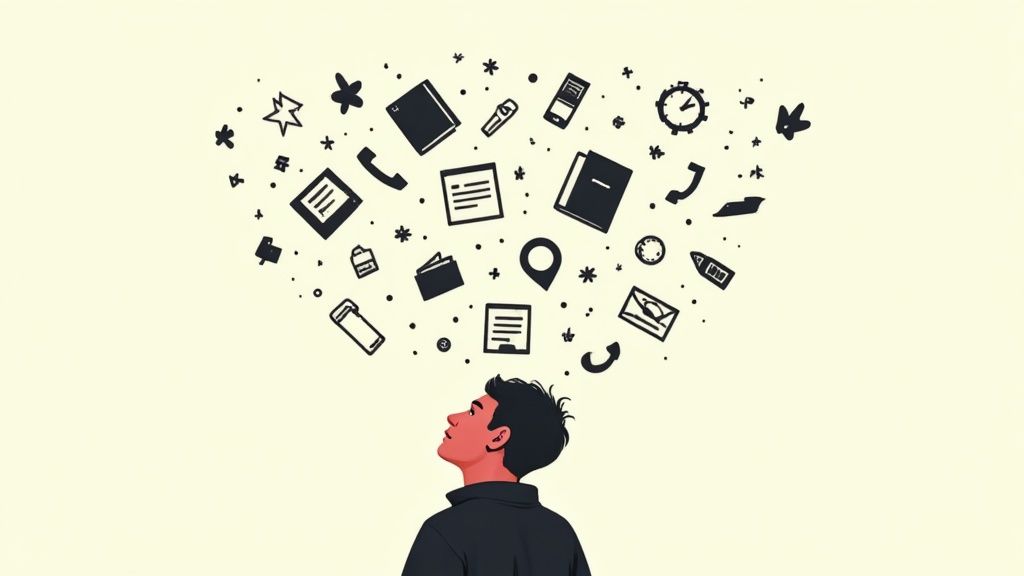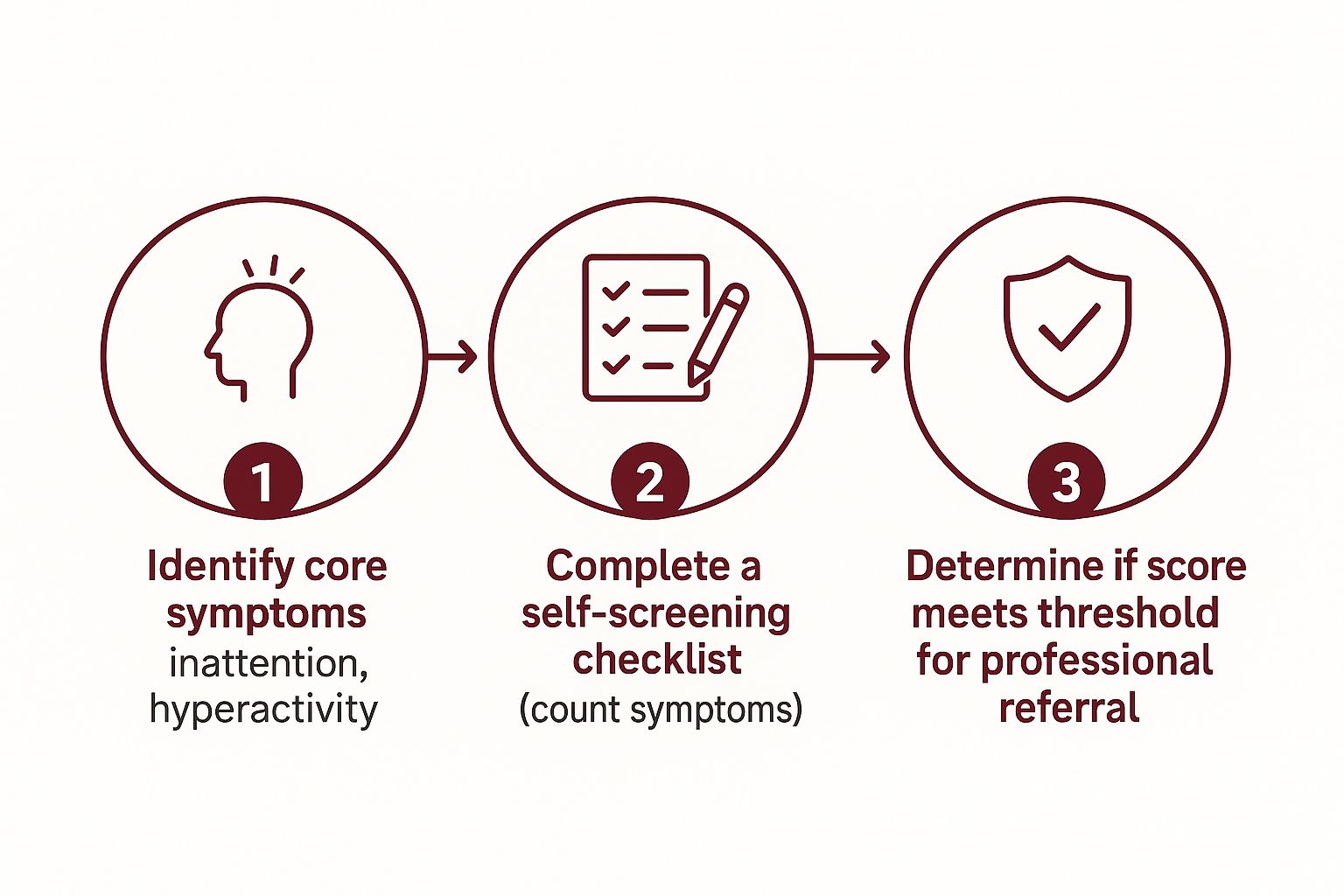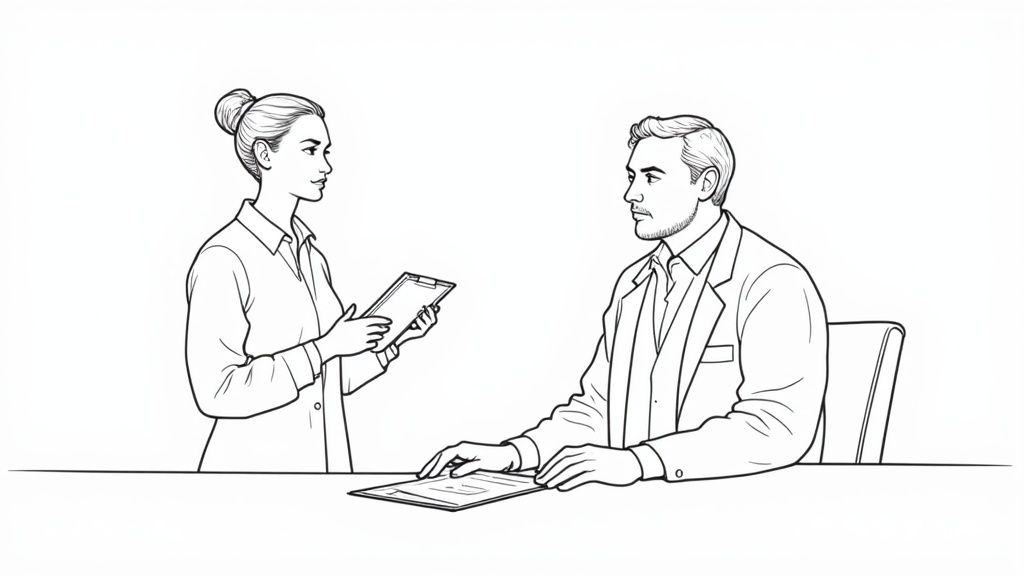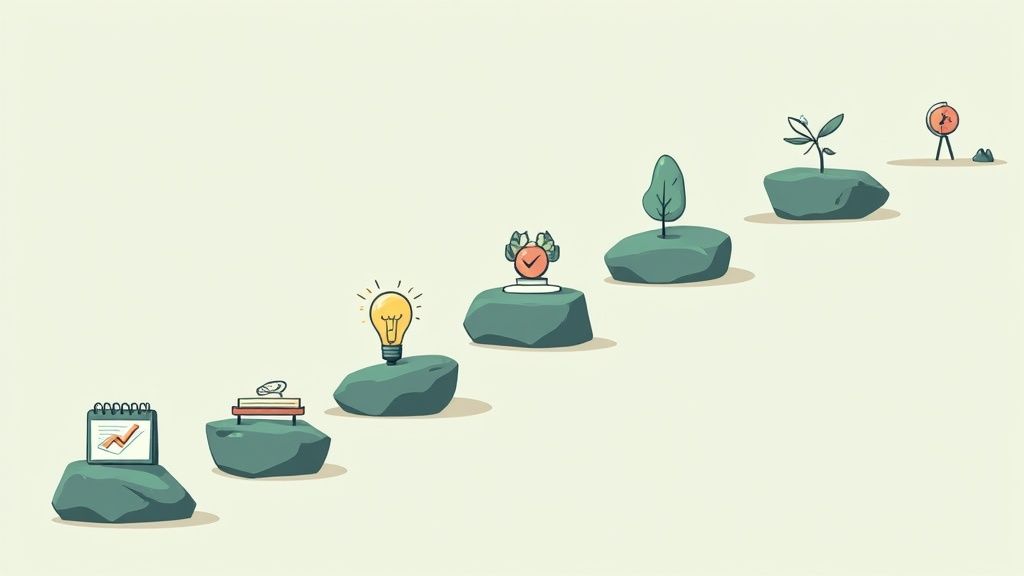Ever get that feeling your brain is running a dozen different programs at once? You're not alone. So many adults wrestle with these challenges for years, never realizing they could be signs of ADHD. This makes the first step toward a diagnosis feel both overwhelming and incredibly empowering.
Do I Have ADHD? Recognizing the Signs
First things first: understanding what adult ADHD actually looks like is the most important step. It's rarely about the stereotypical hyperactive kid. More often, it’s about the subtle, internal struggles that throw a wrench into daily life.
For many of us, this shows up as a constant battle with executive functions—the mental toolkit that helps you manage time, stay focused, and just get things done. This isn't about being lazy or careless. It's about chronically misplacing your keys for the third time this week or feeling completely paralyzed by a simple task like scheduling a dentist appointment. At work, it might be missing deadlines despite pouring your heart into a project or losing steam halfway through something you were initially passionate about.
Connecting Your Experience to ADHD Symptoms
Learning to spot these patterns is a game-changer. These aren't personal failings; they're often just signs of a brain that's wired differently. It's estimated that in 2025, about 404 million adults worldwide will have ADHD, and in the U.S., more than half of them get their diagnosis as an adult.
A really helpful (and low-pressure) first move is to use a self-screening tool. This isn't a diagnosis, but it’s a fantastic way to organize your thoughts before you talk to a professional.
Here’s a glimpse of what an adult self-report scale can look like:
This screenshot from an online ADHD test shows how questions are framed to check the frequency of specific symptoms. It helps translate your personal experiences into a language that a clinician can easily work with.
Key Takeaway: The whole point of self-screening is to arm yourself with concrete examples of how potential symptoms are showing up in your life. That clarity makes the first conversation with a doctor so much more productive and less intimidating.
It's also really common to deal with anxiety while you're figuring all this out, especially when you're trying to shut your brain off for the night. Learning how to calm anxiety at night can be a huge help during this process. For a deeper dive, you can also explore our guide on the common signs of ADHD in adults.
Finding the Right Doctor for an ADHD Evaluation
Knowing you need answers is one thing; finding the right professional to give them to you is a whole different ballgame. The journey toward an official ADHD evaluation really begins when you connect with someone qualified to make a diagnosis. You’ve got a few options, and each brings something different to the table.
Your primary care doctor is often a great first stop. They can do an initial screening and, if it looks like ADHD might be a possibility, refer you to a specialist. For the deep dive, though, you’ll want to see a psychiatrist, a psychologist, or a licensed therapist who really gets neurodiversity.
- Psychiatrists are medical doctors (MDs) who can both diagnose ADHD and prescribe medication.
- Psychologists (Ph.D. or Psy.D.) are the experts in in-depth psychological testing and therapy, but they don't prescribe medication.
- Licensed Therapists & Counselors (like an LCSW, LMFT, or LPC) offer therapy and support, and many are trained in diagnosis. It's worth exploring how an ADHD therapist for adults can guide you through the whole process.
The infographic below maps out these initial steps, from noticing symptoms to getting that professional referral.
This visual shows how recognizing your core symptoms and trying a self-screener can give you the confidence to seek out a formal evaluation.
Weighing Telehealth vs. In-Person Assessments
The way we get healthcare has changed in a big way. It’s no surprise that public interest in ADHD is skyrocketing—online searches jumped by an average of 270.5% between 2019 and 2023. At the same time, telehealth for behavioral health shot up from 41% to 67%, making remote evaluations a totally mainstream option for getting an ADHD diagnosis.
So, should you go with an online assessment or an in-person one? It really comes down to what works best for you.
Deciding between a telehealth or an in-person assessment for ADHD depends on several factors, including convenience, cost, and the level of detail required for the evaluation. Below is a quick comparison to help you weigh your options.
| Factor | Telehealth Evaluation | In-Person Evaluation |
|---|---|---|
| Convenience | Highly convenient; appointments from home, no travel needed. | Requires travel to a clinic, which can be time-consuming. |
| Accessibility | Wider access to specialists, regardless of geographic location. | Limited to local providers, which can mean long wait times. |
| Cost | Often more affordable, with transparent pricing from many platforms. | Can be more expensive; costs may vary widely between providers. |
| Testing Scope | Great for clinical interviews and validated questionnaires. | Necessary for comprehensive neuropsychological testing that requires direct observation. |
| Comfort Level | Can feel less intimidating and more comfortable for some individuals. | Some people prefer face-to-face interaction for a stronger connection. |
| Documentation | Provides official documentation for work or school accommodations. | Also provides official documentation for accommodations. |
Both telehealth and in-person evaluations have their own set of pros and cons. Your final choice should align with your personal needs and what makes you most comfortable.
Telehealth brings incredible convenience right to your doorstep, letting you meet a specialist from the comfort of your home. This alone can seriously reduce the stress and executive function drain of getting to an appointment. That said, in-person visits are sometimes necessary for certain kinds of comprehensive neuropsychological testing.
Ultimately, the best choice is whichever one removes the most barriers and gets you closer to clarity. Whether you use your insurance directory, get a referral from your doctor, or book directly with a specialized telehealth center, the main goal is to connect with an expert who truly understands the nuances of adult ADHD.
How to Prepare for Your ADHD Assessment
Walking into an ADHD assessment prepared can make a huge difference. It turns a potentially nerve-wracking experience into a confident, productive conversation. The goal isn't to build a legal case for yourself; it's to give the clinician a clear, honest picture of your life so they can make an accurate diagnosis.
Being organized helps you avoid that frustrating feeling of walking out and immediately thinking, "Oh, I completely forgot to mention that!"
A great first step is to create a "symptom history." This doesn't need to be some formal, perfectly written document. Just jot down specific examples of how your challenges have shown up over time—from your school days to your career and even in your relationships.
This is especially helpful if you're doing a telehealth ADHD assessment, as having those notes right in front of you can keep you grounded and focused during the virtual meeting.
What to Gather Before Your Appointment
To paint the most comprehensive picture for your clinician, it helps to look beyond your own memories. External documentation provides objective evidence of lifelong patterns, which is a key part of getting an accurate ADHD diagnosis.
Try to find any of the following you can get your hands on:
- Old School Report Cards: Look for those classic teacher comments: "doesn't live up to potential," "daydreams in class," or notes about disorganization and messiness.
- Work Performance Reviews: These can be goldmines, highlighting patterns of missed deadlines, trouble with project completion, or consistent challenges with time management.
- Statements from Others: A brief, honest note from a spouse, parent, or close friend describing their observations can be incredibly insightful for a clinician.
- Personal Notes: Bring any self-screening results, journal entries, or simple lists of symptoms you've already compiled.
The real point here is to show how these patterns have impacted different areas of your life over time. You might not remember struggling with focus in third grade, but a teacher's comment on an old report card provides that crucial piece of your history.
Remember, this preparation isn't just for your doctor—it's for you, too. Taking the time to organize your experiences helps validate your own feelings. It also reduces the chance that you'll downplay your struggles when you're put on the spot in the interview. When you show up with clear examples and supporting documents, you empower yourself to have a truly productive and insightful conversation.
What to Expect During the Diagnostic Process
Getting an official ADHD assessment is a whole lot more than just a quick chat about feeling distracted. It’s a deep dive designed to build a complete picture of who you are, how your brain is wired, and how certain traits have shown up throughout your entire life. Knowing what’s happening behind the curtain can make the whole thing feel less like an interrogation and more like a collaboration.
The journey usually kicks off with a structured clinical interview. This isn’t just a casual conversation; the clinician has a specific goal. They'll walk you through questions tied directly to the diagnostic criteria for ADHD, as laid out in the Diagnostic and Statistical Manual of Mental Disorders (DSM-5). They're looking for consistent patterns of inattention, hyperactivity, and impulsivity.
After the interview, you'll likely be asked to fill out one or more standardized rating scales. A very common one is the Adult ADHD Self-Report Scale (ASRS), which helps put a number to how often and how severely you experience different symptoms. These questionnaires provide solid, objective data to go along with the personal stories you share.
Uncovering Lifelong Patterns
A huge piece of the puzzle is confirming that your symptoms aren't a new thing—they’ve been around since you were a kid. ADHD is a neurodevelopmental condition, which means the clinician needs to find evidence of a lifelong pattern. This is exactly why they’ll ask you so many questions about your school days, childhood friendships, and what things were like at home.
Those old report cards or performance reviews? They're more than just paper. They can be a goldmine of historical data, with comments from teachers about you being "easily distracted" or "not living up to potential." This kind of historical context is a cornerstone for an accurate diagnosis.
Ruling Out Other Conditions
It's really important to know that even with the rise in ADHD awareness, clinicians take this process very seriously. A good evaluator isn't just looking for signs of ADHD; they're also looking for signs of things that aren't ADHD.
This process is called differential diagnosis. It’s the clinical term for ruling out other conditions that can look a lot like ADHD—things like anxiety, depression, or even thyroid problems. Your evaluator is carefully sifting through all the possibilities to make sure the final diagnosis is the right one.
In the United States, about 11.4% of children between 3-17 had an ADHD diagnosis as of 2022, with boys being diagnosed about twice as often as girls. You can find more details on ADHD prevalence at SingleCare.com. These numbers show just how important it is for assessments to be thorough and evidence-based.
Once you understand the "why" behind every questionnaire and each question about your past, you can feel much more in control of the process. The goal here is clarity—to finally put a name to your experiences and map out a clear path forward.
You Have a Diagnosis. Now What Happens?
Getting an ADHD diagnosis isn’t the end of the road—it’s actually where the journey begins. That assessment report in your hands is your first real tool. You might see terms like "inattentive type" or "combined type," which simply describe your main symptoms and give your clinician a starting point for your support plan.
Think of that document as your personal roadmap. The very next step is sitting down with your clinician to talk through it and build a treatment plan that actually feels right for you. This isn't just about medication, though that can be an incredibly effective piece of the puzzle for many people. It’s about creating a holistic strategy that fits into your life.
Creating Your Support System
Your plan will likely be a mix of a few different approaches, since each one offers unique benefits for managing ADHD symptoms and building new, practical skills.
- Therapy: Cognitive Behavioral Therapy (CBT) is a game-changer for a lot of people. It’s a great way to develop concrete coping mechanisms you can use every day.
- ADHD Coaching: A coach is more hands-on. They can help you set realistic goals and build the systems you need for better time management and organization—two areas where many of us struggle.
- Medication: Whether it's a stimulant or non-stimulant, medication can make a huge difference in improving focus and regulating emotions, which often feel like they're all over the place.
The real goal here is to find the right combination of tools. For some, therapy alone is enough. For others, medication plus coaching creates the perfect structure for them to succeed.
Finally, your diagnosis is a powerful tool for advocating for yourself. You can now officially request reasonable accommodations at work or school, like asking for a quieter workspace or getting extended deadlines on big projects. This is how your diagnosis transforms from a simple label into a lever for creating an environment where you can genuinely thrive.
Common Questions About ADHD Diagnosis
Even after mapping out the steps, it’s completely normal to have a few lingering questions. The whole process of getting an ADHD diagnosis can feel pretty big and tangled, but getting clear answers to the most common concerns usually helps everything click into place.
Let’s get straight to the one on everyone's mind: the financial side of things.
How Much Does an ADHD Diagnosis Cost?
This is a tough one because the cost of an ADHD evaluation can be all over the map. It really depends on your insurance plan, where you live, and the kind of provider you go with.
An assessment could cost a few hundred dollars with an in-network psychiatrist, but a full neuropsychological exam might run into several thousand. Your first move should always be to call your insurance company directly and get a clear picture of what your specific plan covers.
Can I Get Diagnosed With ADHD Online?
Absolutely. Many reputable telehealth services now offer ADHD assessments with fully licensed professionals, and it’s a game-changer for accessibility. The process typically involves video calls and filling out digital questionnaires.
The key is to do your homework. Make sure you verify the platform's credibility and, just as importantly, confirm that their diagnosis is accepted for any treatment or accommodations you might need in your state.
An online diagnosis is a valid and often more accessible route for many adults seeking answers. The key is ensuring the provider is qualified and the process is thorough.
What if the Evaluation Says I Do Not Have ADHD?
Getting a result that says you don't have ADHD is far from a dead end. In fact, it’s incredibly valuable information.
Think of it this way: you’ve successfully ruled out one possibility. The assessment process itself can often shine a light on other conditions that might be behind your symptoms, like anxiety, depression, or even a sleep disorder. This new information gives you a much clearer direction for finding the right kind of support and treatment.
At Sachs Center, our specialists provide compassionate, expert ADHD evaluations from the comfort of your home. If you're ready for clarity, book your telehealth assessment with us today.



